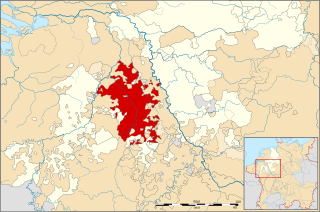Life
Wilhelm was a member of a minor comital family from the region of the Meuse (Maas) valley. [1] He was active in Cologne as the elector-archbishop's secretary under his predecessor Walram von Jülich and was one of his most important advisers.
After Walram's death, Wilhelm was elected archbishop. The King and Emperor Charles IV was opposed to his nomination, but Wilhelm had the support and protection of Brabant and France, and was duly appointed by Pope Clement VI.
Wilhelm was an unusually efficient ruler, and soon managed to stabilise the archbishopric's financial position, which was the prerequisite for the effective exercise of its territorial powers. His energetic internal politics formed the basis for (by and large) unwarlike and successful foreign politics, which culminated in an intensive engagement in imperial politics. He not only established political relations with France, England and north-west Europe, but was apparently involved in the formulation of the Golden Bull of Charles IV in 1356.
His unceasing activity quickly exhausted Wilhelm and he died on 15 September 1362 in Cologne, where he was buried in a monumental tomb which he had prepared for himself in the Chapel of the Cross (Kreuzkapelle) in Cologne Cathedral.
Wilhelm promoted the construction of the cathedral, and supported the cathedral building guild of the time. He boosted the financing of the building works by obtaining reliefs for the archbishopric from the pope. He also showed a certain respect, not universally shared, towards his predecessor in that he had an equally magnificent tomb built for him too.

Adolf was Count of Nassau from about 1276 and elected King of the Romans from 1292 until his deposition by the prince-electors in 1298. He was never crowned by the Pope, which would have secured him the title of Holy Roman Emperor. He was the first physically and mentally healthy ruler of the Holy Roman Empire ever to be deposed without a papal excommunication. Adolf died shortly afterwards in the Battle of Göllheim fighting against his successor Albert of Habsburg.

The Electorate of Cologne, sometimes referred to as Electoral Cologne, was an ecclesiastical principality of the Holy Roman Empire that existed from the 10th to the early 19th century. It consisted of the Hochstift — the temporal possessions — of the Archbishop of Cologne, and was ruled by him in his capacity as prince-elector. There were only two other ecclesiastical prince-electors in the Empire: the Electorate of Mainz and the Electorate of Trier. The Archbishop-Elector of Cologne was also Arch-chancellor of Italy and, as such, ranked second among all ecclesiastical and secular princes of the Empire, after the Archbishop-Elector of Mainz, and before that of Trier.

The Archbishopric of Magdeburg was a Roman Catholic archdiocese (969–1552) and Prince-Archbishopric (1180–1680) of the Holy Roman Empire centered on the city of Magdeburg on the Elbe River.

Wilhelm Egon von Fürstenberg-Heiligenberg was a German count and later prince of Fürstenberg-Heiligenberg in the Holy Roman Empire. He was a clergyman who became bishop of Strasbourg, and was heavily involved in European politics after the Thirty Years' War. He worked for the Archbishop-Elector of Cologne and Louis XIV of France at the same time, and was arrested and tried for treason for convincing the Elector to fight on the opposite side of a war from the Empire.

The Duchy of Jülich comprised a state within the Holy Roman Empire from the 11th to the 18th centuries. The duchy lay west of the Rhine river and was bordered by the Electorate of Cologne to the east and the Duchy of Limburg to the west. It had territories on both sides of the river Rur, around its capital Jülich – the former Roman Iuliacum – in the lower Rhineland. The duchy amalgamated with the County of Berg beyond the Rhine in 1423, and from then on also became known as Jülich-Berg. Later it became part of the Duchies of Jülich-Cleves-Berg.
Adolf of Altena, Adolf of Berg or Adolf of Cologne, was Archbishop of Cologne from 1193 to 1205.

The Prince-Bishopric of Münster was a large ecclesiastical principality in the Holy Roman Empire, located in the northern part of today's North Rhine-Westphalia and western Lower Saxony. From the sixteenth to the eighteenth centuries, it was often held in personal union with one or more of the nearby ecclesiastical principalities of Cologne, Paderborn, Osnabrück, Hildesheim, and Liège.

Ernest of Bavaria was Prince-elector-archbishop of the Archbishopric of Cologne from 1583 to 1612 as successor of the expelled Gebhard Truchsess von Waldburg. He was also bishop of Münster, Hildesheim, Freising and Liège.

Peter of Aspelt was Archbishop of Mainz from 1306 to 1320, and an influential political figure of the period. He brought the archbishopric to its peak of power.

The Prince-Bishopric of Paderborn was an ecclesiastical principality (Hochstift) of the Holy Roman Empire from 1281 to 1802.

Walram of Jülich was Archbishop of Cologne from 1332 to his death in 1349.

Ruprecht of the Palatinate was the Archbishop and Prince Elector of Cologne from 1463 to 1480.
Adolf III of Schauenburg (1511–1556) was the Archbishop-Elector of Cologne from 1547 to 1556.
Anton of Schauenburg was Archbishop-Elector of Cologne from 1557 to 1558.
Friedrich IV of Wied (1518–1568) was the Archbishop-Elector of Cologne from 1562 to 1567.

Johann Schweikhard von Kronberg was the Archbishop-Elector of Mainz from 1604 to 1626.
Johann Ludwig von Hagen (1492–1547) was the Archbishop-Elector of Trier from 1540 to 1547.

Johann Hugo von Orsbeck (1634–1711) was the Archbishop-Elector of Trier from 1675 to 1711.
Diether of Nassau, German: Diether von Nassau was a clergyman from the Walramian branch of the House of Nassau. From 1300 to 1307 he was Archbishop and Elector of Trier as Diether III.
The imperial election of 1346 in the Holy Roman Empire was orchestrated by Pope Clement VI after the pope had pronounced the deposition of the Emperor Louis IV. The pope's candidate, Charles of Moravia, was duly elected by five of the imperial electors at Rhense on 11 July.
This page is based on this
Wikipedia article Text is available under the
CC BY-SA 4.0 license; additional terms may apply.
Images, videos and audio are available under their respective licenses.












